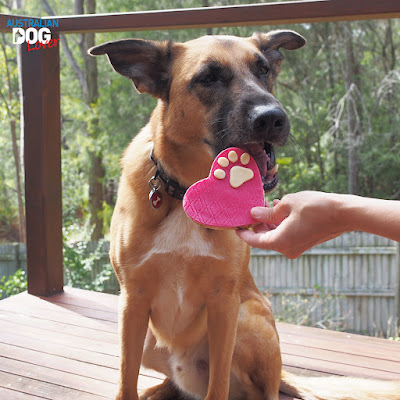Written by
Australian Dog Lover
12:31:00
-
0
Comments
American author and marriage counsellor Gary Chapman developed five love languages [1] to outline the different ways we give and receive love, these include words of affirmation, quality time, physical touch, acts of service and receiving gifts. Much like humans, our pets have specific, and often quirky, ways they like to show and receive love, whether they associate with just one or all five love languages, recognising this can help to strengthen your bond.
With Valentine’s Day around the corner, PETstock ambassador and pet behavioural expert Lara Shannon has unpacked the five love languages to help you identify what language your furriest family member speaks, so you can shower them with affection on Monday 14 February.
#1. Words of affirmation
 |
| "We are family, I got all my dogs with me" |
Pets that have words of affirmation as one of their love languages will look engaged and alert when you’re talking to them.
Happy meows, purrs, barks, and wagging tails are common behaviours of pets who show and feel love through sounds and words.
#2. Quality time
There are countless ways you can spend time with your pet from going on walks, playing with toys, hitting the dog park, to just simply sitting side by side on the couch together. Whatever form your quality time takes, be sure to give them your undivided attention.
#3. Physical touch
For pets with physical touch as their love language, cuddling, petting, tummy scratching or grooming can make them feel all warm and fuzzy.
If your pet’s love language is physical touch, they will often want to be as close to you as possible by sitting on your chest or lap, offer their head or belly for pats, and shower you with kisses.
#2. Quality time
If you have a dog or cat that always wants to be near you and goes crazy when you leave and return to the house, quality time is one of their love languages.
There are countless ways you can spend time with your pet from going on walks, playing with toys, hitting the dog park, to just simply sitting side by side on the couch together. Whatever form your quality time takes, be sure to give them your undivided attention.
#3. Physical touch
For pets with physical touch as their love language, cuddling, petting, tummy scratching or grooming can make them feel all warm and fuzzy.
If your pet’s love language is physical touch, they will often want to be as close to you as possible by sitting on your chest or lap, offer their head or belly for pats, and shower you with kisses.
It’s important to provide pets who frequently exhibit these behaviours with plenty of physical attention, as this is the main way they will feel loved by you.
#4. Acts of service
Pets that gladly obey your commands speak this love language. These pets are intelligent, obedient, complete tasks quickly, and tend to show high levels of restraint and discipline, and because of these traits, they are often used for pet therapy.
Show ‘acts of service’ pets that you love them in return by providing lots of praise when they’ve done a good job.
#4. Acts of service
Pets that gladly obey your commands speak this love language. These pets are intelligent, obedient, complete tasks quickly, and tend to show high levels of restraint and discipline, and because of these traits, they are often used for pet therapy.
Show ‘acts of service’ pets that you love them in return by providing lots of praise when they’ve done a good job.
#5. Receiving gifts
If your dog or cat’s eyes light up when they’re given a new toy or treat, gift-receiving is likely to be one of their love languages.
You can use this love language to its fullest potential by saving the gifts as a reward for desirable behaviours.
You can use this love language to its fullest potential by saving the gifts as a reward for desirable behaviours.
For example, give your dog their favourite treat when they stop barking or for not begging for food at dinner time.
MEDIA RELEASE, February 2022
2022 Valentine's Day Gifts for Dogs and Pet Parents








